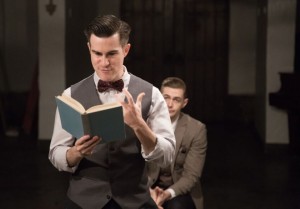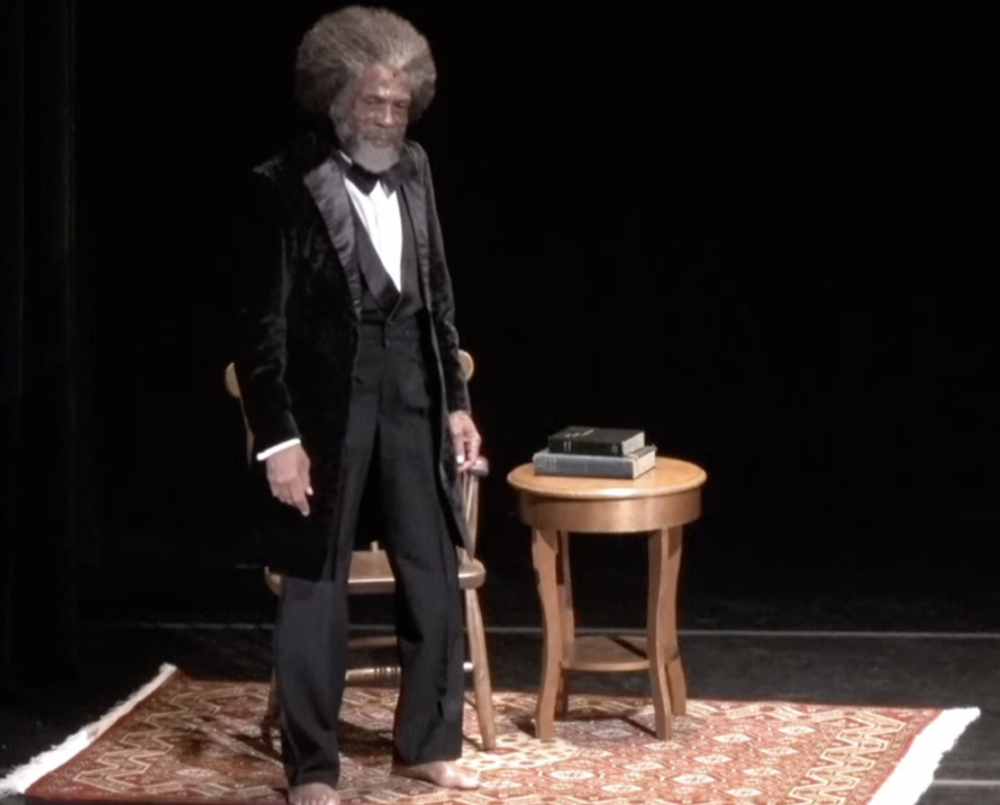by JK Clarke
Gay rights in the United States have taken great strides in the past decade or two. So much so that it’s easy to lose sight of the vast array of discrimination LGBT persons in this country faced not even twenty years ago. Unsurprisingly, the further one goes back in this country, the harsher and more repugnant the treatment. In Veritas, the new site-specific production by The Representatives (playing through November 7 in the sanctuary of St. George’s in Stuyvesant Square) we get a look at a specific incident in 1920 at Harvard University in which ten happy, productive and intelligent young men were ruined merely because of their sexuality.
Imagine if the boys from The Dead Poets Society grew up, went to Harvard, and were queer. Those would be our boys of Veritas. A vibrant group of smart, eloquent and passionate gay men who managed to find each other and create a supportive community within the bounds of the Harvard University student body. When one of their own, Cyril Wilcox, has a breakdown and leaves school because of failing grades and near non-existent attendance, his friends rally around, sending letters of support and keeping up, as best they can, with his well being. But ultimately he kills himself, devastating all. Upon his death, his brother George (DeLance Minefee) discovers some of the letters and, noting their salacious content, takes them to the Harvard Dean. As a result, the boys are interrogated, shamed for their sexaulity and most are expelled, save the most devious and political among them: Brahmin sleazebag, Gilkey (played to comic effect by Brendan Spieth), and Joseph (a suave Marquis Rodriguez) who ultimately becomes a lawyer, of course. A terrible story, to be sure, but made all the more nauseating by the fact that it’s true (a trove of the school’s administrative documents was recently uncovered and examined, unveiling this tragic and heretofore unknown event).
The most frustrating part of the story lies in the realization that up until Cyril’s death their homosexuality seemed to be a fairly well-known, and relatively insignificant secret. Like drinkers during Prohibition (which had coincidentally just begun and figures into the story here) the group seemed to live more or less openly. People just tended to look the other way.
Though Veritas feels long-winded at times and could benefit from constructive edits, co-Directors Stan Richardson and Matt Steiner manage to break it up into separate sections, which serve more as a necessary distraction than anything else. The audience is moved into three different theatrical settings in the intriguing and atmospheric church basement during the course of the play, and are served drinks before curtain and during intermission. Great hosts are these! There’s also the use of several theatrical devices, like characters rotating on the stage and repeating their lines like a scratched record, that initially serve as welcome distractions, though they ultimately begin to feel too excessive gimmicky. And while the production is promoted as “site-specific,” it certainly could be played powerfully on any stage. It just so happens that the “Cave @ St. George,” the basement of St. George’s Church on Stuyvesant Square, has several intriguing rooms that serve the purpose quite nicely.
Despite some acoustic difficulties and a sometimes erratic “flow” to the play, Veritas has great promise, and is blessed with an enthusiastic and passionate cast. The directors don’t shy away from featuring a stereotypically flamboyant and promiscuous character, Ernest Roberts (a very amusing Amir Wachterman) because he is merely one of many personalities, not a cliché. The others are mainstream, exceptional only in their intelligence and enthusiasm for life. Like debonair Nathaniel Wollf (John Garrett Greer), a classic man of letters, who hearkens John Updike, and pines for Matt Steiner’s Keith Smerage, a budding thespian, often found rehearsing lines from Shakespeare’s The Winter’s Tale. He focuses most on a scene in which Hermione defiantly defends her integrity against slander: “. . . no life,/ I prize it not a straw, but for mine honour,/Which I would free, if I shall be condemn’d /Upon surmises . . .” Indeed the plea of the innocent, vilely disparaged, is the theme these men can best sink their teeth into. And it is what makes their story so compelling. And so painful.
Veritas. Through November 7 at The Cave @ St. George’s (209 E. 16th Street, between Third Avenue and Rutherford Place). www.therepresentatives.org/veritas
* photos by Matt Steiner
























